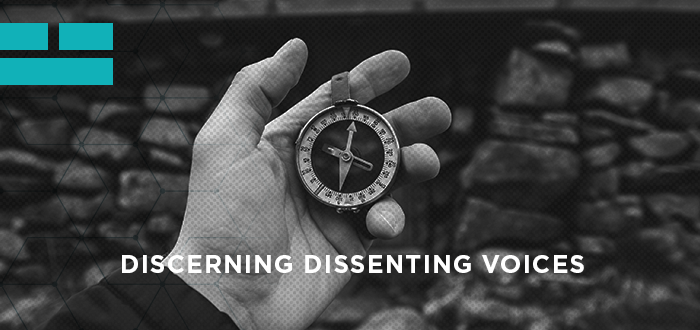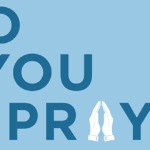There’s only one problem with dissent: a lot of people don’t want to hear it.
All week long we are focusing our attention on what it means to be a dissenting voice for your team, and a discerning team with a powerful voice. It’s not an easy conversation, but a necessary practice for the healthy and spiritual well-being of your teams.
Dissent defined is the position of variance held against the perceived current opinion. Which is to say, the nay. It’s the voice(s) against the prevailing opinion and it matters more than we often give it credit.
Complainers & D.A.s Are Not Dissenters
Some folks are naturally gifted at offering invaluable critique or healthy opposition. Others like to “play devil’s advocate,” but are usually just gaming, others are just eager complainers, and others just like to grumble. This is not a post for them. This post is to highlight the value that dissent adds to your team. As the guy who usually has the first idea about too many things, I will tell you that hearing dissent can hurt, until you see it work.
The Value of Dissent
If you are working on a team or leading a team, you should value dissent. There is health and growth in the places where dissent is valued. It actually creates a stronger team and culture.
In places where dissenting opinions are encouraged, employees report greater job satisfaction, and leaders are able to consider a wider range of proposals and options before making decisions.
Why?
Sociologist Serge Moscovici wrote about the disproportionate power of the single voice, he wrote that if there was just one dissenting voice, “it was enough to induce different cognitive processes that yield better judgment.” There is observably better decision-making, wisdom, and practices emerging from places where pushback is permitted and encouraged. It alters the ways in which people are allowed to think about their role in the process. If you have ever run a meeting—humble yourself, and create space for some feedback.
Dissent well— offer suggestions or solutions instead of only poking holes.
If you find yourself as the dissenting or disagreeing voice, consider how you might deliver it. Trying packaging dissent with a suggestion or solution. You don’t have to figure it out for the other person, but show some vested interest in imagining how we could.
One of my best friends is the best critic I know. He can spot the weakness in any argument or the flaw in any idea, but often his brand of criticism comes raw. He’s usually right, but when he pokes holes, it hurts. It takes a lot of trust to receive critique well. If you find yourself on the dissenting side more often than not, consider your contributions to the team, but also consider the level of relational trust you have with your leaders. The deeper the trusting relationship, the easier it is to stomach the truthful refutation.
The Spiritual Discipline of Discernment
If you are leading a team, might I suggest this…
I have been really convicted that we need to reinstitute the practice of discernment at an organizational level.
More than just our personal prayer time to hear from the Lord, we need a space for corporate prayer and discernment. Asking, seeking, and listening for what God is calling us to do. A weekly or monthly prayer practice that leans in on this is freeing for honest dialogue. Discernment calls us to cut away other priorities to tune our thoughts and ears to what God is speaking, where God is moving, how God is calling. To get to the heart of what God is calling us to do, we must cut away in both our plans and schedules to listen.
This should look different than your weekly staff prayer and meeting circle. There should be time given, not just allotted, for leaders to prayerfully seek God’s voice together. This next season of ministry is going to be overwhelmingly demanding and “noisy” as many voices compete for the direction of where we oughta get to next. There is even more division coming in some places and I pray that the parts that are cut, parsed, and discerned away are made from the center of healthy and earnest God-seeking leaders.
The question of who should be on the receiving end of your dissent is an important one. To bring about any real change, you’ll need to express your ideas to someone who can actually do something and I can imagine no healthier way to foster leadership relationships first through prayer together.
Learn to listen to God and one another. It’s the most practical way to do ministry.
This content was written by Zac Workun. Zac serves as the Student Ministry Training Specialist for Lifeway and is one of the co-founders of Youth Ministry Booster. He has served the local church in various youth ministry roles for over 15 years.




